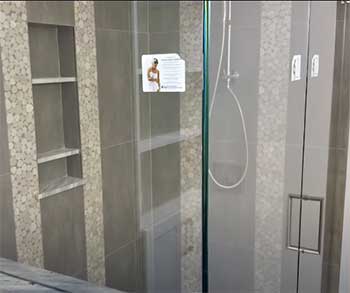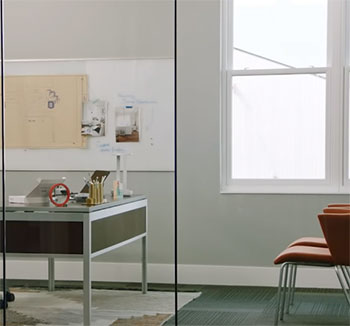If you’re remodeling your bathroom or building a new home, choosing the right glass for your shower enclosure is an important decision. Low iron glass has become a popular option in recent years due to its clarity and lack of greenish tint.
But is this premium glass really worth the higher price tag compared to standard clear glass?
In this article, we’ll examine the pros, cons, cost, and other factors to consider when deciding on low iron glass for your shower.
What Is Low Iron Glass?

Low iron glass, also known as low-E or low emissivity glass, gets its name from having low amounts of iron oxide during the manufacturing process.
Iron oxide is added to standard glass to provide strength and durability.
However, it also causes the greenish-blue tint you see in typical clear glass.
With low iron glass, manufacturers use purer raw materials with less iron and metals.
As a result, low iron glass has high visible light transmittance, allowing more sunlight to pass through while reducing the greenish color.
This gives low iron glass exceptional clarity and transparency with a crystal clear appearance.
Benefits of Using Low Iron Glass for Showers
There are several benefits that make low iron glass an appealing choice for showers and other bathroom applications:
- Visually Appealing Clarity
The ultra clear and colorless aesthetic of low iron glass provides a clean, elegant look in any bathroom. Without the greenish tint, it offers truer color rendition for a more upscale, luxurious appearance.
- Enhanced Illumination
Low iron glass transmits up to 92% of visible daylight without color distortion. This maximizes natural light within the shower and bathroom. With more light penetration, the space will feel brighter and more open.
- Easy Cleaning
The slick, smooth surface quality of low iron glass resists hard water spots, soap scum buildup, and mineral deposits. This makes cleaning the glass easier, faster, and streak-free. Keeping your shower enclosure sparkling is less of a chore.
- Privacy
Although low iron glass is crystal clear, it still provides a degree of privacy within the shower. The clarity can make it easy to forget there’s glass there until you see light reflecting off it. Frosted or textured options are available for even more privacy.
- Durability
Low iron glass has similar strength, hardness, and durability compared to regular glass. It can stand up to daily wear and tear, temperature changes, and moisture within a shower enclosure. Proper installation also ensures the glass remains securely fixed and stable.
- Energy Efficiency
The low emissivity qualities of low iron glass helps reduce heat loss through the glass. This contributes to energy efficiency and temperature control within the bathroom. Less heat escaping through the glass lowers energy costs.
Disadvantages of Low Iron Glass
While the pros of low iron glass outweigh the cons for many homeowners, there are some downsides to consider:
- Higher Cost

Low iron glass is approximately 30% to 50% more expensive than standard clear glass. The specialized manufacturing and high-quality materials drive up the cost. For a larger or more intricate shower enclosure, that price difference can add up.
- Vulnerability to Damage
Like regular glass, low iron glass can still be susceptible to scratches, chips, cracks, and shattering. Handling it carefully during transport and installation is important to avoid damage. Signs of normal wear and tear may also be more visible due to its clarity.
- Condensation and Water Spots
The slick surface of low iron glass can cause condensation and water droplets to form noticeable beads. Fog and water spots may be more apparent and bothersome with low iron glass since it’s so optically clear. Proper bathroom ventilation can help reduce this issue.
- Difficult to Repair
If low iron glass does incur damage, it’s harder to repair than standard glass. The high purity and lack of tint make it difficult to match to an existing piece. In most cases, the entire piece of glass will need replacement.
- Reflectivity
The ultra clear coating on low iron glass can result in light reflecting off the surface more noticeably. This is usually only an issue if the glass has defects or uneven application of the low-E coating. Proper installation helps minimize reflectivity.
Should I Get Low Iron Glass for My Shower Door?
Whether or not to invest in low iron glass is an individual decision based on your budget, design preferences, and how long you plan to stay in the home. Here are a few factors to help determine if it’s worthwhile for your shower enclosure:

- Budget – The higher material and installation costs mean low iron glass is more of an expensive upgrade. If you have flexibility in your bathroom remodel budget, the added expense may be justified for you.
- Desired Appearance – If creating a light, open, and upscale bathroom aesthetic is important to you, low iron glass can help achieve that goal. The clearer view and light transmission contribute to the appeal.
- Daily Use – Frequently used showers and bathrooms with multiple users will benefit more from low iron glass. The easier cleaning and maintenance are perks for higher traffic areas.
- Shower Size/Layout – Larger showers and more intricate enclosure designs make the clarity of low iron glass more impactful visually. Small basic showers likely don’t need the premium glass to get good light transmission.
- Resale Value – Upscale bathrooms with high-end finishes like low iron glass shower enclosures can recoup 80-90% of remodel costs if selling the home. It adds value for potential buyers as well.
Cost Comparison of Low Iron vs. Standard Clear Glass
To help inform your decision, here is a typical cost comparison of low iron glass versus basic clear glass for a shower enclosure:
- Basic clear glass shower door (48″ x 72″): $250 – $450
- Low iron glass shower door (48″ x 72″): $400 – $700
- Basic clear glass shower enclosure (60″ x 32″): $700 – $1500
- Low iron glass shower enclosure (60″ x 32″): $1200 – $2500
As you can see, low iron glass ranges from about 30% to 50% more in cost compared to standard clear glass. The price also depends on the overall size and number of glass panels needed. However, the benefits of beauty, durability, and easy maintenance over time can make the added expense worth it for many homeowners.
Potential Alternative Options To Low Iron Glass For Shower Enclosures
Textured Glass
Textured glass is clear glass that has been treated with chemicals or physical processes to produce a frosted, pebbled, or stamped pattern. This opaque glass provides more privacy than standard clear or low iron glass.
The textured finish helps conceal what’s behind the glass while still allowing light to pass through. Popular textured glass options for showers include:
- Frosted glass – Features an etched, grainy surface that obscures vision but maintains brightness.
- Rain glass – Covered with minute water droplet-like textures for a softly blurred view.
- Pebble glass – Has an allover bumpy pebble-like pattern that obscures images behind it.
- Fluted glass – Contains parallel ridged lines across the surface that distorts sightlines.
The downside is textured glass can cut down on the sense of openness and views compared to clear options. The texture patterns also make it slightly harder to keep clean.
Tinted Glass
Tinted glass has color additives introduced during production to provide a dark tint while still allowing visibility. Popular tint colors for shower doors include gray, bronze, and blue.
Benefits of tinted glass:
- Provides extra privacy over clear glass since silhouettes behind the glass are obscured.
- Available in a variety of hues to match your bathroom design.
- Has a stylish, modern aesthetic for contemporary spaces.
Drawbacks of tinted glass:
- Reduces natural light transmission into the shower more than clear glass.
- Gives a somewhat closed off feeling compared to completely transparent glass.
- Isn’t as seamless looking for an open concept bathroom layout.
Obscured Glass
Obscured glass refers to glass that is opaque or translucent rather than fully see-through. Types of obscured glass for showers include:
- Acid etched glass – Goes through an acid bath to achieve its frosted matte finish.
- Low emissivity coated glass – Has a metallic coating that limits visibility while maintaining some transparency.
- Spandrel glass – An opaque glass option containing ceramic frit baked into the glass.
Benefits of obscured glass:
- Provides complete privacy for the shower interior.
- Allows light diffusion into the space.
- Has a uniform, elegant look.
The drawbacks:
- Limits natural light transmission compared to clear glass.
- Can make a small shower feel more closed in.
- Blocks views in and out of the shower enclosure.
Clear Glass
Clear glass like low iron or standard glass provides complete visibility and an airy feel. Glass treatments like etching, screening, or texturing add decorative touches and some obscurity. Clear glass shows water spots readily and requires frequent cleaning.
Patterned Glass
Patterned glass adds visual interest with pressed designs for a textured, wave-like surface. The patterns diffuse views to maintain privacy while allowing light through. Rectilinear, floral, and abstract shapes provide unique decorative touches.
Frosted Glass
Frosted glass is treated with acid or mechanical abrasion to create an opaque, pebbly surface that obscures views and diffuses light. A standard frosted appearance provides full privacy, while translucent varieties allow some visibility.
FAQ About Low Iron Glass for Showers
The main disadvantages are the higher cost, vulnerability to damage, visibility of condensation, reflectivity issues in certain lighting, and difficulty of repairs. It also provides minimal privacy compared to textured glass.
If an ultra clear aesthetic and brighter interior are important to you, low iron glass is likely worth the upgrade for your shower door. It also enhances natural light within the bathroom. Just account for the higher material and installation costs.
For most homeowners who want a high-end bathroom look and user experience, low iron glass is worth the extra investment. The visual clarity, easy maintenance, light transmission and durability make it a feature that adds value over time.
Yes, low iron glass is approximately 30% to 50% pricier than standard clear glass. The purity of materials and specialized manufacturing process results in a premium product that costs more than basic glass.
Low iron glass can make a noticeable difference in the appearance of a shower. The lack of greenish tint provides true color transmission and zero distortion of views in or outside the shower. Low iron glass allows more light transmission for a brighter, lighter feel. The see-through clarity highlights the shower interior rather than the glass itself. The result is a contemporary, sleek look popular in modern bathrooms. While standard glass can have a subtle green tint, low iron glass has no discernible tint or color.
The best glass for a shower depends on your needs and design tastes. No-tint low iron or clear glass provides complete visibility for a light, airy feel. For soft ambiance, tinted or frosted glass let in natural light while obscuring views. Combinations of glass types add decorative privacy.
The Bottom Line
When it comes to choosing glass for your shower enclosure, low iron glass certainly has its pros and cons to weigh. While the upfront cost is higher, the benefits like enhanced aesthetics, easier cleaning, and durability make it a worthwhile investment for many homeowners.
If you have the budget and desire for a contemporary, upscale bathroom, low iron glass is sure to deliver on looks and performance. Carefully compare the costs and factor in potential long term value. If the crystal clarity and lighting improvements call to you, low iron glass won’t disappoint.
